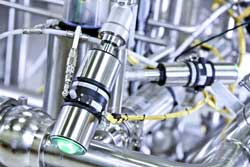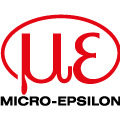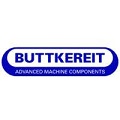
Posted to News on 25th Aug 2011, 07:38
Drinks manufacturer installs intelligent process valves
A drinks manufacturer has installed Burkert intelligent process valves with AS-interface communications, thereby benefiting from simplified plant design, installation and operation.

Companies operating in the competitive global market for food and beverage additives, such as concentrates and flavours, have to ensure that their production processes are not only safe and hygienic but also as efficient as possible. This has led to an increased demand for process automation. However, the conventional approach of centralised automation of process valves cannot adequately meet the ever more stringent requirements of the industry. Intelligent process valves with integrated automation functions offer a viable and efficient alternative.
With centralised automation systems, comprising control cabinets with valve terminals, I/O systems and field bus interfaces, the valves at field level are connected to the central control unit through a large number of extended control air lines and discrete feedback connections. Apart from the high costs for the time-consuming planning and installation, this approach is not entirely without problems with respect to hygiene.
A recently upgraded production plant for fruit juice concentrate and other basic ingredients for beverages and food products underlines the benefits of a more efficient distributed control system. The new facility includes intelligent process valves from Burkert. These valves are used by the drink manufacturer across the entire production area in a decentralised control system with communications via an AS-interface fieldbus. As part of this system, all hygienic seat valves controlling the product flow, on-off valves for the auxiliary circuits for water, steam, sterile air and cleaning are automated in a decentralised mode by means of intelligent valves. Moreover, with this decentralised system the only tasks remaining with the central process control system are control and status monitoring, resulting in major savings in overall system project costs and improved transparency in system operation.
AS-interface benefits
The integration via AS-i means that the advantages of decentralised automation can be utilised to the full. All that is required for power supply and communication is a two-wire cable connecting the PLC with up to 62 valves. Each process valve is individually connected to the main compressed air supply line installed in the field, whereby these connections are kept as short as possible. This reduces the number and length of tubing and cable connections, as well as the number of required control cabinets, to a minimum.
An additional benefit is that the colour status indicators of the valves can be clearly seen from anywhere in the plant, which further improves the transparency of the process. Moreover, as the process valves can be manually operated through the pilot valves at the control head, the operation of the machine is made even simpler.
The reliability and efficiency of the decentralised automation system for production and auxiliary functions at the beverage plant has resulted in the decentralised control model being applied to new sections installed to further expand production facilities for additives. Today, the raw product intake unit, the homogenisation and pasteurisation station, and the raw product distribution system are equipped with intelligent process valves from Burkert. Angle seat and diaphragm valves control the flow of cleaning media, including acid, alkaline and water, as well as the steam and sterile air supply. All the valves are equipped with Element clean-line control heads with integrated automation functions, and AS-interface connections for communication via fieldbus.
Easy system expansion
Sebastian Kundel, Segment Manager Hygienic Processing at Burkert, comments: "For the extension of the plant, we were able to pursue the decentralised automation concept across the entire system, using our intelligent valve systems. As the operating and maintenance staff were already familiar with the fieldbus system and the connecting and wiring concept, the new plant sections could be commissioned without any difficulties. To sum up, the practical integration at field level of automation functions in the pneumatic drivers of the process valves allows for a high degree of automation at minimum costs and ensures excellent transparency.
"Thanks to the modular design of the valve systems, customised automation solutions can be devised easily and quickly. This is due to the fact that Brkert offers not only process valves, but also digital electro-pneumatic positioners and process controllers that can be combined in the same manner to provide complete control valve systems."
The intelligent valves units used at the drinks plant comprise a valve actuator and control head. They are manufactured according to the EHEDG guidelines for hygienic design and easy cleaning. The valve units feature the high IP protection required for the actual application and are manufactured exclusively from detergent-proof materials. The IP protection is therefore not affected by long-term use under conditions of high air humidity, or by frequent cleaning with aggressive chemicals. This is of great advantage especially to valve nodes, as there is often a problem of detergent solution or water escaping through valve leakage, resulting in frequent cleaning of the immediate area to ensure consistent plant hygiene.
Clean control air
A further key feature of the Burkert intelligent valves, which ensures reliable, trouble-free operation, is the provision of an integrated control air inlet to the actuator chambers. This ensures that the spring chamber of the pneumatic driver is supplied only with clean control air. Moisture, dust and contaminants in the ambient air cannot enter the actuator units and this, in turn, effectively prevents contamination of the piston seals and corrosion of the drive springs by cleaning solutions.
This design means that there is also no risk of moisture from the spring chamber entering the feedback module or the control head along the spindle extension. It also significantly prolongs the service life of the driver, and enhances the hygiene of the process. As product cannot enter the driver, both the spreading of germs and contamination of the driver by mould are effectively prevented. The risk of spores produced in the spring chamber being ejected into the ambient air at each switching process, which is a common problem with conventional valves, is thus eliminated.
Contact Burkert for more information about intelligent process valves or use the form on this page.
Fluid Control Centre
1 Bridge End
GL7 1QY
UNITED KINGDOM
+44 (0)1285 648720






























